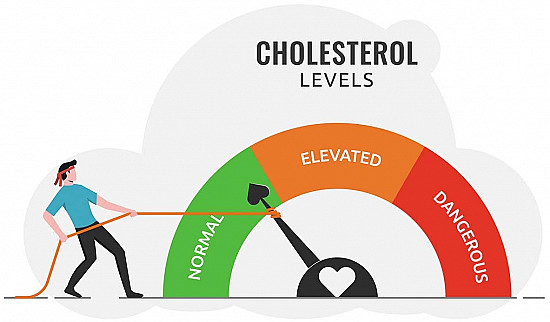If you have ever tried to lose weight, put on weight, or simply watched an advert for cooking oil, then you know what cholesterol is—or do you?
Despite how often we speak about it, cholesterol is highly misunderstood. The fact is most people have been taught that all cholesterol is bad, and this is completely false. Not only are some cholesterol good for you, human beings cannot survive without it.
So, why do we believe it is bad?
This article will explain what cholesterol is, how it relates to cardiovascular health and what to do when it is too high.

Understanding Cholesterol
Cholesterol is a waxy substance found in your blood. While your body needs cholesterol to build healthy cells, having high levels of cholesterol can increase your risk of heart disease. There are two main types of cholesterol:
- Low-Density Lipoprotein (LDL) – Often referred to as “bad” cholesterol, high levels of LDL can lead to the buildup of plaque in your arteries, which can cause heart disease and stroke.
- Lipoprotein (a) – this is a type of LDL that has been shown to put people at a higher risk of heart and blood vessel disease. Lipoprotein (a) is genetic and the level you have as a child tends to stay the same for years.
- High-Density Lipoprotein (HDL) – Known as “good” cholesterol, HDL helps remove other forms of cholesterol from your bloodstream.
The Importance of Monitoring Cholesterol
In Nigeria, cardiovascular diseases (CVD) are a leading cause of death. According to research published in the American Heart Association Journals, CVD accounts for roughly 10% of deaths in the country. High cholesterol is a significant risk factor, contributing to the development of conditions such as atherosclerosis, heart attacks, and strokes.
Regular monitoring of your cholesterol levels is essential. A simple blood test can measure your cholesterol levels and help you and your healthcare provider develop a plan to manage it if necessary.
Factors Affecting Cholesterol Levels
Several factors can influence your cholesterol levels, including:
- Diet: Consuming foods high in saturated fats, trans fats, and cholesterol can raise your cholesterol levels.
- Weight: Being overweight can increase your cholesterol levels.
- Physical Activity: Lack of exercise can lead to weight gain and higher LDL levels.
- Age and Gender: Cholesterol levels naturally rise as you age. Before menopause, women typically have lower total cholesterol levels than men of the same age. After menopause, women’s LDL levels tend to rise.
- Genetics: High cholesterol can run in families, making it important to know your family health history.
Managing Cholesterol Levels
Managing your cholesterol involves lifestyle changes and, in some cases, medication. Here are some effective strategies:
- Healthy Diet: Eat a diet rich in fruits, vegetables, whole grains, and lean proteins. Limit foods high in saturated fats and trans fats.
- Regular Exercise: Aim for at least 30 minutes of moderate to vigorous exercise most days of the week.
- Maintain a Healthy Weight: Losing even a small amount of weight can help reduce cholesterol levels.
- Avoid Smoking: Smoking lowers HDL (good) cholesterol.
- Medication: If lifestyle changes are not enough, your doctor may prescribe medication to help lower your cholesterol.
How CareValue Health Can Help
At CareValue Health, we understand the importance of managing cholesterol and preventing heart disease. Our team of healthcare professionals offers online consultations to help you monitor and manage your cardiovascular health. We also offer in-clinic consultations and tests when needed,Whether you need dietary advice, exercise recommendations, or medication management, our experts are here to guide you every step of the way. Click here to book a virtual or physical consultation.


